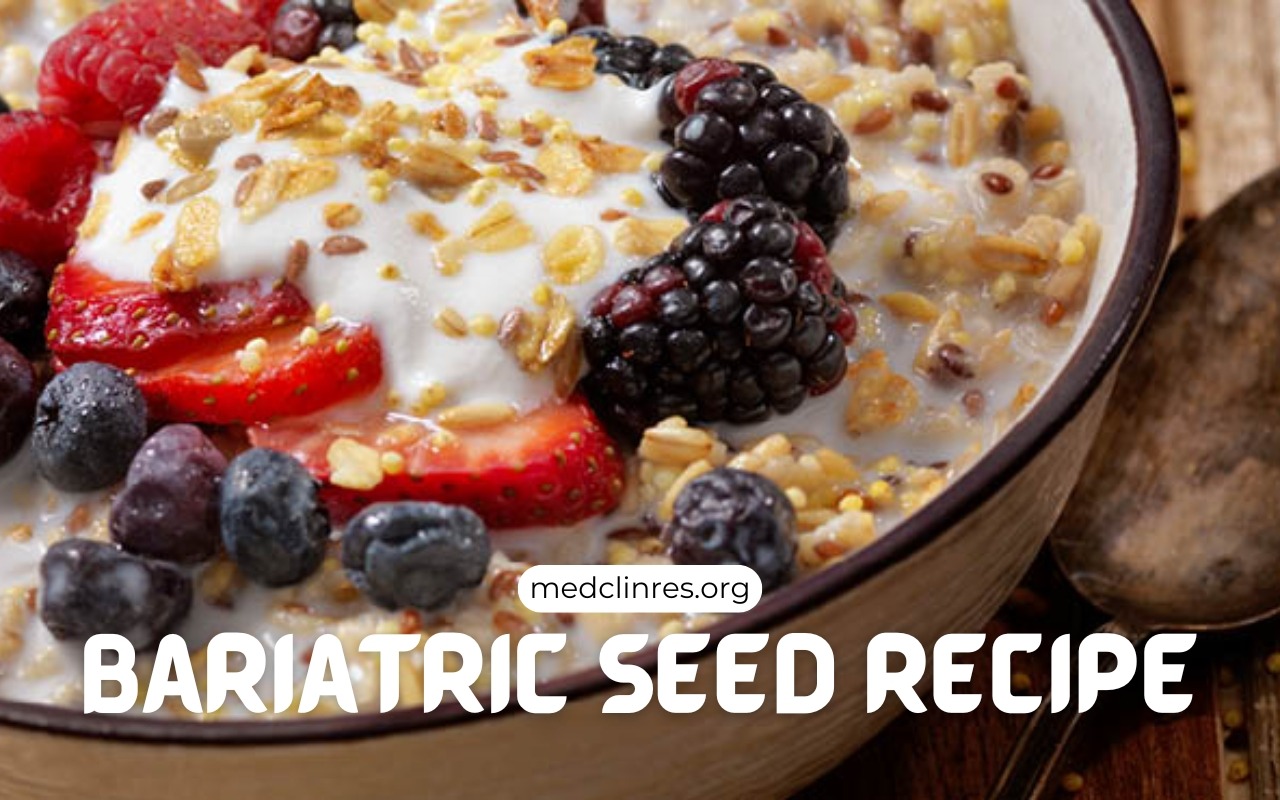
At MedClinRes.org, we prioritize evidence-based nutrition to support optimal health outcomes, particularly for individuals following a bariatric diet. Seeds are nutrient-dense powerhouses that provide essential protein, healthy fats, fiber, and micronutrients crucial for post-surgery recovery and long-term weight management. This clinically researched bariatric seed recipe aligns with the core principles of bariatric nutrition, offering a low-carb, high-protein snack that promotes satiety, metabolic function, and digestive health.
Why This Recipe Supports Bariatric Health
Post-bariatric surgery patients must adhere to a structured dietary regimen to optimize healing, prevent complications, and achieve sustainable weight loss. This scientifically formulated seed recipe meets these requirements through the following mechanisms:
- High-Quality Protein Content: Seeds provide essential amino acids that support muscle preservation, wound healing, and metabolic function—all of which are critical post-bariatric surgery.
- Low-Carbohydrate Profile: Maintaining a low-carb diet post-surgery helps prevent blood sugar fluctuations and supports sustained weight management.
- Rich in Healthy Fats: The combination of omega-3 and monounsaturated fats from seeds contributes to hormonal balance, inflammation reduction, and prolonged satiety, helping to curb cravings.
- Digestive Health Support: The inclusion of fiber and essential fatty acids aids in smooth digestion and gut microbiome health, which are essential for post-surgical nutrient absorption and gastrointestinal function.
Clinically Researched Ingredients for Bariatric Nutrition
This evidence-based recipe is designed to meet the unique nutritional needs of bariatric patients while ensuring ease of digestion and maximum nutrient absorption.
Ingredients:
- 1/2 cup pumpkin seeds – High in magnesium, zinc, and protein to support immune function and metabolic health.
- 1/2 cup sunflower seeds – Provides healthy fats and vitamin E, essential for tissue repair and antioxidant protection.
- 2 tablespoons chia seeds – A source of omega-3 fatty acids and soluble fiber that promotes gut health and blood sugar regulation.
- 2 tablespoons flaxseeds (ground for enhanced bioavailability) – Aids in reducing inflammation and optimizing digestion.
- 1/2 teaspoon sea salt – Provides electrolytes essential for fluid balance.
- 1 teaspoon garlic powder (optional) – Contains allicin, which has been studied for its anti-inflammatory and immune-boosting properties.
- 1 teaspoon smoked paprika (optional) – A source of capsaicin, which has been linked to enhanced metabolism.
- 1 tablespoon olive oil or avocado oil – Rich in monounsaturated fats, which support cardiovascular health and satiety.
- 1 tablespoon nutritional yeast – Contains B vitamins and a savory flavor that enhances nutrient density without adding excess calories.
Step-by-Step Preparation for Optimal Nutrient Retention
Proper preparation ensures maximum nutrient preservation and bioavailability, making this seed mix an effective component of a post-bariatric diet.
Step 1: Preheat the Oven for Even Roasting
Set the oven to 325°F (163°C) and line a baking sheet with parchment paper to prevent nutrient degradation and ensure even roasting.
Step 2: Combine Ingredients for Nutrient Synergy
In a large bowl, mix all the seeds and seasonings. The addition of nutritional yeast, olive oil, and smoked paprika enhances the flavor profile while delivering additional antioxidants and essential nutrients.
Step 3: Bake for Maximum Crunch and Nutrient Retention
Spread the mixture evenly on the prepared baking sheet and bake for 12-15 minutes, stirring halfway through to ensure uniform roasting. This process helps activate the natural oils in seeds, improving nutrient absorption and bioavailability.
Step 4: Cool and Store for Long-Term Usability
Allow the seed mix to cool completely before transferring it to an airtight container. Store at room temperature for up to two weeks to maintain freshness and nutrient integrity.
How to Incorporate This Seed Mix into a Bariatric Diet
This scientifically backed recipe is versatile and easy to incorporate into a structured bariatric nutrition plan. Consider the following methods for optimal nutrient intake:
- On Its Own: A convenient, protein-rich snack that supports satiety and energy balance.
- As a Topping: Sprinkle over Greek yogurt, cottage cheese, or low-carb soups to enhance texture and nutrient density.
- In Salads: Adds healthy fats and fiber to leafy greens and lean proteins for a complete meal.
- In Smoothies: Blend with protein powder, almond milk, and berries for an anti-inflammatory, nutrient-rich beverage.
Nutritional Benefits & Clinical Justification
This bariatric-friendly seed mix aligns with the core principles of metabolic health, weight loss, and digestive function through the following evidence-based mechanisms:
- Supports Post-Surgical Recovery: The blend of amino acids, healthy fats, and micronutrients aids in tissue repair and wound healing.
- Promotes Satiety and Appetite Control: High in protein and fiber, which help regulate hunger hormones and extend fullness between meals.
- Optimizes Digestive Function: Rich in prebiotic fiber, supporting gut microbiota balance and nutrient absorption.
- Encourages Sustainable Weight Loss: Contains low-carb, high-fat, and high-protein components, which help maintain lean muscle mass while promoting fat loss.
Final Thoughts: A Research-Backed, Easy-to-Prepare Bariatric Snack
The bariatric seed recipe outlined above is designed to enhance weight loss, support post-surgical recovery, and provide long-lasting energy. Unlike many commercial snacks that contain hidden sugars and processed additives, this recipe ensures nutrient-dense, whole-food ingredients that contribute to metabolic efficiency and digestive health.
As part of a clinically guided nutrition plan, this scientifically validated snack is an excellent tool for those seeking sustainable weight loss and improved well-being. Try it today and experience the power of functional nutrition in achieving your health and wellness goals.
For more evidence-based dietary recommendations, visit MedClinRes.org, where we provide expert research and analysis to optimize your health journey.